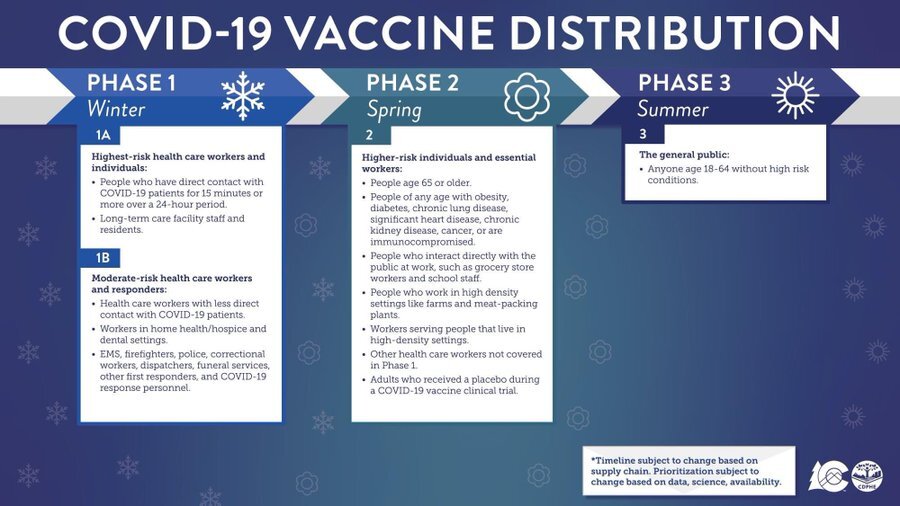Colorado health care workers react to COVID-19 vaccine's availability

CENTENNIAL, Colo. — The morning of Monday, December 14 was a historic one for the state of Colorado, as it received its very first shipment of the recently approved Pfizer COVID-19 vaccine.
By the late afternoon, health care workers on the front lines of the pandemic in Colorado were receiving their first dose of the highly anticipated vaccine. Because Colorado makes up about 1.7% of the country’s population, the state received 1.7% of the available vaccine doses—about 46,800 of them.
Centura Health, Colorado’s largest hospital system, received 5,755 doses for its high-risk health care workers.
“This is a really important day for the front line workers of Centura Health—our nurses, our doctors, our environmental services workers, and everyone in between that serves our COVID patients in the communities in which they live,” said Dr. Shauna Gulley, Chief Clinical Officer for Centura Health.
Colorado has a three-phase vaccine distribution plan. The first phase, which the state is currently in, includes vaccinations for high-risk health care workers and individuals (and long-term care facility staff and residents), and then for moderate risk health care workers.
The low-risk general population isn’t expected to receive a vaccine until this summer, during phase three. More information on the vaccination plan is available here.

“The process for distributing the COVID-19 vaccine is one that’s very important to us, because it enables us to ensure that those health care workers that have the greatest exposure to COVID-19 patients and COVID-19 patient products, are at the very front of the line to receive this vaccine should they choose to do so,” Gulley said.
Rocky Mountain PBS asked Centura Health if hospital employees would be required to receive a COVID-19 vaccine if they are eligible to receive one.
“Centura highly encourages its employees to take the vaccine, but we do not require it,” said Lindsay Radford, director of communication for Centura Health. “If an employee on the front lines chooses not to take the vaccine, they will continue to follow our safety protocols, wearing the appropriate safety equipment/PPE.”
Asked what Centura would do with the leftover vaccine doses if an employee opts not to receive it, Radford said “we will use every dose, so we will call in additional health care workers to be vaccinated if necessary.”
We also asked Radford if hospital workers who turned down the vaccine would see their responsibilities change with regards to who they’re permitted to treat. “Their responsibilities won’t change,” Radford said. “PPE is highly effective, allowing them to continue to do their lifesaving work!”
Gulley said Centura Health recently conducted a survey that asked hospital employees if they would take the COVID-19 vaccine if one was available for them tomorrow.
“Ninety-two percent of the physicians who returned the survey said that they would choose to have the COVID vaccine today,” Gulley said. However, just 66% of Centura’s health care workers overall said they would take the vaccine, which is just a few points higher than the average.
According to the latest PBS NewsHour/NPR/Marist Poll, 61% of Americans said they would take the COVID-19 vaccine if it was available for them.
"There is no statewide vaccination mandate. Employers may be able to require COVID-19 vaccination for in-person work for their employees, but an employee may be entitled to an exemption through the ADA and Civil Rights Act of 1964," a spokesperson with the Colorado Department of Public Health and Environment said in an email. "The state of Colorado is not currently pursuing any mandates. The U.S. Equal Opportunity Commission has more information on this on their website."
Rocky Mountain PBS asked Governor Jared Polis if he would support treating the COVID-19 vaccines like the state treats the flu vaccine: Colorado requires all licensed health care facilities to ensure that at least 90% of staff members receive a flu shot. We have not heard back from the governor’s office, but will update this story when we do.
“This really has been an incredible acceleration of science,” Gulley said of the speed with which multiple vaccines were developed and approved. “We make a human baby in just under 10 months. And we were able to go from the start of a global pandemic to the beginning of the end of a pandemic in that same period of time.”
Related stories:
